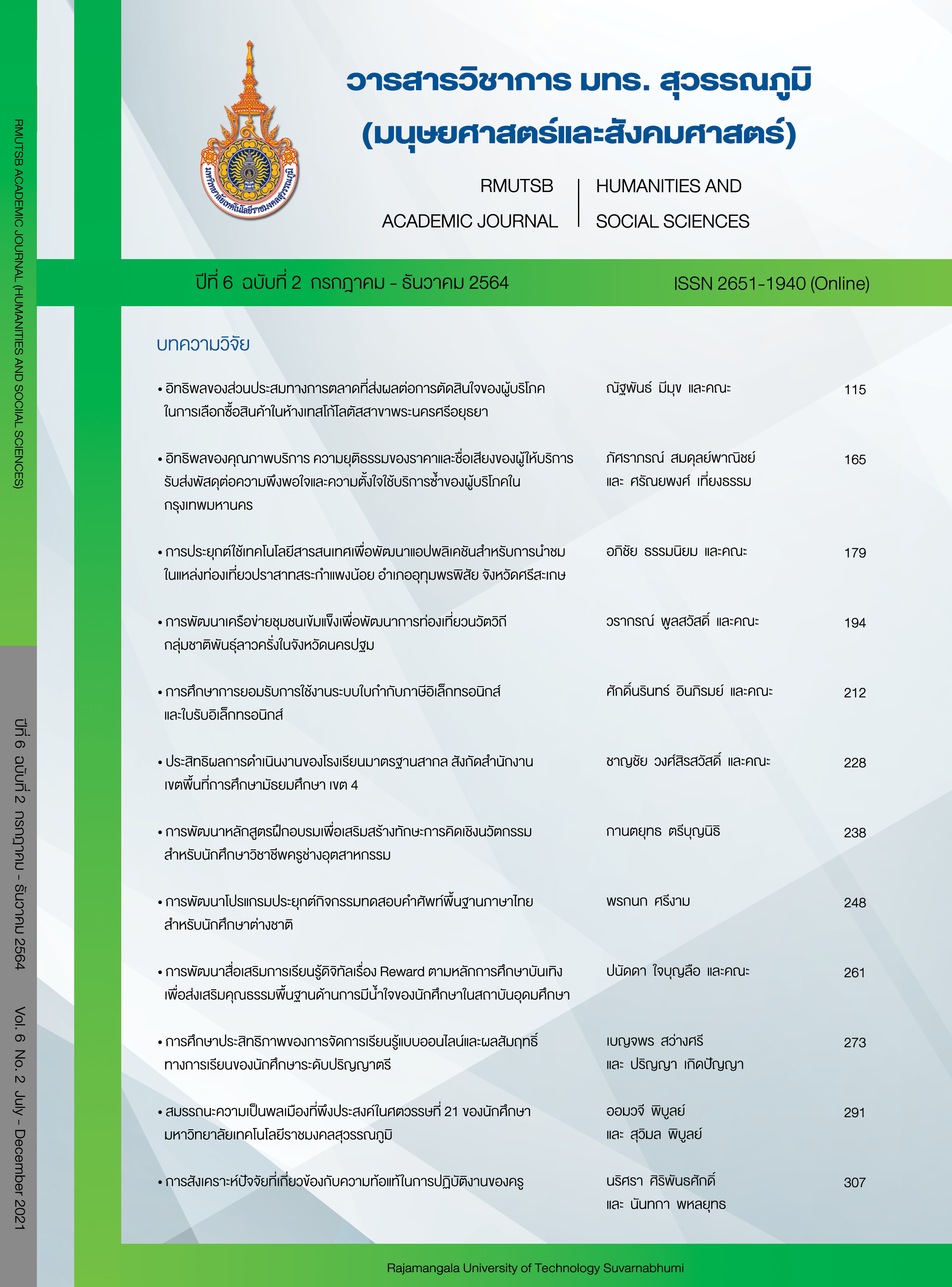Desirable citizenship competencies in the 21st century of the students at Rajamangala University of Technology Suvarnabhumi
Main Article Content
Abstract
The purposes of this research were to 1) studied the desirable citizenship competencies in the 21st century of students, 2) studied the best practices for developing desirable citizenship competencies in the 21st century of students, and 3) synthesized the appropriate approaches for developing the desirable citizenship competencies in the 21st century of students. The sample consisted of 378 undergraduate students by stratified random sampling and the sample size was determined according to the Yamane method at 95% confidence level. Research instruments were Likert rating scale questionnaire, open-ended questionnaire, and interview items for focus group discussion. Data were analyzed by mean, standard deviation, t-test, ANOVA, and content analysis for open-ended questionnaire and focus group discussion.
The research results suggested that the overall score of the desirable citizenship competencies in the 21st century of students is at the high level (=4.11, S.D.=0.71). In comparative study between groups by gender, faculty, year of study, learning center; and achievement level, it is found that students at Hantra center got higher score in citizenship competencies in the 21st century than students at Suphanburi center, at a significance level of 0.05. It is also found that students with good academic achievement (grade=2.50-2.99) had higher membership performance with moderate/fair academic achievement (grade=2.00-2.49) at a significance level of 0.05. In terms of the best practices for developing desirable citizenship competencies in the 21st century of students, it is found that family background and educational experience have a profound impact on the development or the enhancement of characteristics or performance of the students in the 21st century. The appropriate approaches for developing the desirable citizenship competencies in the 21st century of students were through learning management in the courses that teachers have to design. Students are allowed to take action and solve problems by themselves. The teachers are responsible for guiding and facilitating students' learning in order to achieve sustainable and permanent self-learning, through student activities, special projects, or project-based learning that focus on building the growth mindset of students. The projects should focus on analytical thinking, creative thinking, problem-solving, communication and interpersonal skills, moral and ethics, and performance as an active citizen, through student self-development activities that allow students to develop themselves in terms of self-regulation, self-confidence, and being an active learner. The activities should focus on information and technology skills, life skills, the 21st century living skills, moral and ethics, and performance as an active citizen.
Article Details
References
Chaumnaseaw, P. (2016). Core competency of Thai citizenship under Democracy (research report). Bangkok: Ramkhamhang University. (in Thai)
Jatuporn, O. (2014). Citizenship literacy curriculum: The perspective for developing student for global citizenship in the 21st century. Social Sciences Research and Academic Journal, 9(27), 1-14. (in Thai)
Meeraka, P. (2017). Teacher's characteristics of 21st century. MBU Education Journal, 5(2), 23-35. (in Thai)
Mepadit, K. (2019). Undergraduate characteristics of 21st century with general education courses. The 14th National and International Sripatum University Conference (pp. 1-10). Bangkok: Sripatum University. (in Thai)
Office of the Education Council. (2018). Global citizenship education development: GCED. Bangkok: Prigwan Graphic. (in Thai)
Office of the Education Council. (2017). National education plan 2017-2036. Bangkok: Prigwan Graphic. (in Thai)
Parnichparinchai, T. (2017). Citizenship of undergraduate students in Naresuan University. The Golden Teak: Humanity and Social Science Journal, 23(1), 1-13. (in Thai)
Phacharuen, W. (2018). Characteristics of good citizenship in a democratic society of students in Maejo University. MBU Education Journal, 6(1), 148-161. (in Thai)
Phinla, W. (2017). Guidelines for learning management in social studies in the development of critical thinking skills for the 21st century learners. Parichart Journal, 30(1), 13-34. (in Thai)
Ponpichai, W. (2018). Good Citizenship characteristics of science and fisheries technology faculty's students, Rajamangala University of Technology, Trang campus. Humanities and Social Sciences Ubon Ratchathani University, 9(1), 109-133. (in Thai)
UNESCO. (2019). Global citizenship education: Preparing learners for the challenges of the 21st Century. Paris: UNESCO.
Viphatphumiprathes, T. (2013). Democratic citizenship of Dhurakij Pundit University students (research report). Bangkok: Dhurakij Pundit University. (in Thai)
Viphatphumiprathes, T. (2017). Instructional guidelines on civic education in Thai higher education. Journal of Education Prince of Songkla University, Pattani Campus, 28(3), 13-23. (in Thai)
World Economic Forum. (2018). The global competitiveness report. Geneva: World economic forum. Retrieved June 21, 2020, from https://www.weforum.org/agenda/2016/03/21st-century-skills-future-jobs-students.


